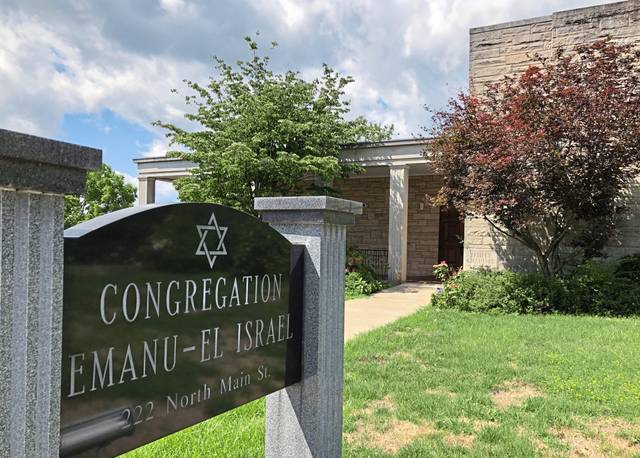https://naviga.triblive.com/local/westmoreland/coronavirus-impacts-high-holy-days-in-jewish-community/
Coronavirus impacts High Holy Days in Jewish community

In a typical year, members of the Jewish community would’ve dressed up and assembled Friday night at the local temple for two days of services with friends, family and fellow congregants to mark the start of the High Holy Days.
Rosh Hashanah and Yom Kippur in 2020 are different.
Congregations throughout western Pennsylvania this year are forced to deal with the impacts of the coronavirus pandemic that, in most cases, will result in worship from home or with limited capacity for in-person services that in normal years are the most attended.
“To me, the biggest issue is that usually we all get together, worship then have a meal together. We can’t do that this year. It’s probably the biggest disappointment we have is that people can’t get together,” said Rabbi Lenny Sarko, who will lead his second High Holy Days services since arriving last year at Congregation Emanu-El Israel in Greensburg.
The temple’s 80 or so families gathered remotely for services that started Friday night and run through Sunday to celebrate the Jewish New Year.
Sarko and his wife will be the only two people at the synagogue. He will run the service as usual from the bimah, the stage at the front of the sanctuary, as his wife works the camera. Services will be broadcast through a video conferencing application for congregants to watch live and participate in from home. The Shofar, the ram’s horn that is blown on Rosh Hashanah to mark the beginning of a new year, will be remote as well.
“We’ll open it up 30 minutes early so people can see each other and talk to each other,” Sarko said. “I know some people are dressing up at home because we can see them,” Sarko said.
Rosh Hashanah is the start of a 10-day period that serves as the period of atonement and judgment for Jews. It ends with Yom Kippur, the holiest day on the Jewish calendar.
The more than 900 Jewish families, who in normal years would worship at Rodef Shalom in the Squirrel Hill neighborhood of Pittsburgh, will also be at home this year to watch shortened prerecorded services streamed on YouTube.
“It’s been an incredibly challenging set of responsibilities in pulling this all together,” said Rodef Shalom Rabbi Aaron Bisno.
Like most synagogues, Rodef Shalom has kept its doors closed for worship during the pandemic. It will reopen next week for Yom Kippur.
“We’re bringing in people just for the memorial service, 50 people at a time,” Bisno said.
At Chabad of Squirrel Hill, an orthodox congregation that adheres to strict tenets of Jewish observance, worshipping during the High Holy Days will be in person, albeit with limited capacity that is socially distanced. Services will then move outside Sunday afternoon when the Shofar will be blown every 30 minutes. Congregants will be assigned time slots to attend the outdoor Shofar service.
“The pandemic is a curve ball and obviously we have a great challenge here,” said Chabad Rabbi Yisroel Altein. “We can’t control the pandemic. We can only control our behavior.”
At Congregation Emanu-El Israel, Sarko said the pandemic actually improved participation in worship as online services have enabled those who, for whatever reason, haven’t been able to attend, to participate from home. Sarko said concessions made because the pandemic outweigh the importance of gathering in person to worship during the High Holy Days.
“We think it’s important to be safe,” Sarko said.
Copyright ©2026— Trib Total Media, LLC (TribLIVE.com)
